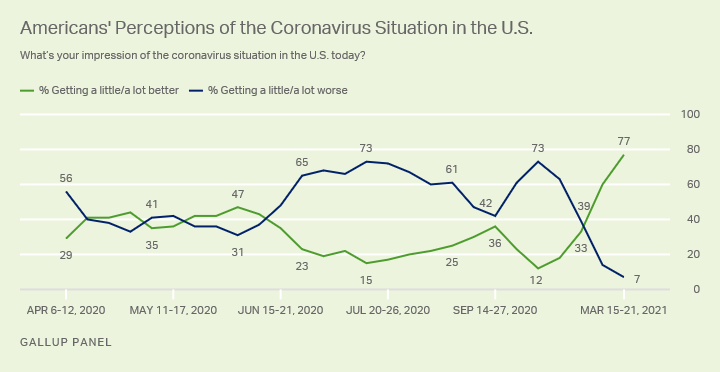The US state with the fastest growing covid-19 caseload is a state that has experienced some of the harshest and longest lockdowns and covid restrictions: Michigan. As of April 20, the seven-day moving average for new covid cases in Michigan was 790 per million. This is higher than any other US state, and it is several times higher than the case rate for Michigan a year ago. It is comparable to what it was at the beginning of cold and flu seasons last fall, when Whitmer issued orders for a new round of business closures. In other words, if Whitmer were using the same metrics she was using to justify lockdowns in the past, she absolutely would be imposing very strict lockdowns now. Frankly, the case numbers in Michigan are terrible by the standards of those who use
Topics:
Ryan McMaken considers the following as important: 6b) Mises.org, Featured, newsletter
This could be interesting, too:
Nachrichten Ticker - www.finanzen.ch writes Die Performance der Kryptowährungen in KW 9: Das hat sich bei Bitcoin, Ether & Co. getan
Nachrichten Ticker - www.finanzen.ch writes Wer verbirgt sich hinter der Ethereum-Technologie?
Martin Hartmann writes Eine Analyse nach den Lehren von Milton Friedman
Marc Chandler writes March 2025 Monthly
The US state with the fastest growing covid-19 caseload is a state that has experienced some of the harshest and longest lockdowns and covid restrictions: Michigan.
As of April 20, the seven-day moving average for new covid cases in Michigan was 790 per million. This is higher than any other US state, and it is several times higher than the case rate for Michigan a year ago. It is comparable to what it was at the beginning of cold and flu seasons last fall, when Whitmer issued orders for a new round of business closures.
In other words, if Whitmer were using the same metrics she was using to justify lockdowns in the past, she absolutely would be imposing very strict lockdowns now. Frankly, the case numbers in Michigan are terrible by the standards of those who use case numbers to push more covid restrictions.
At the moment, Michigan is under a partial lockdown, with restaurant capacity at 50 percent and a plethora of rules still in place over the size of domestic dinner parties and backyard barbecues. Mask mandates are everywhere. Yet, in spite of the clear upward trend in cases, Whitmer is resisting calls from the Biden administration and the CDC to force yet another stay-at-home order on the people of Michigan. Whitmer now says that Michigan residents can be trusted to use their own common sense and good judgment:
Policy change alone won’t change the tide…. We need everyone to step up and to take personal responsibility here.
This is certainly the opposite of what she was saying a year ago. Last spring, allowing people to exercise “personal responsibility” was absolutely out of the question, and “policy change” was the most important thing in the world. For Whitmer and the lockdown enthusiasts, lockdowns were synonymous with successful control of the disease, pure and simple. Personal discretion on the part of ordinary citizens was absolutely not to be tolerated.
Indeed, during much of 2020, Whitmer appeared to delight in lambasting violators of her many decrees, and lecturing Michigan taxpayers almost daily about the need to stay home and avoid all travel. To not heed her words, the narrative went, was to “kill grandma.”
So why has she changed her tune? The fact is, public attitudes about covid are rapidly changing, and Whitmer wants to stay in office. After all, this was never “about the science.” This was about governors giving the mob what it wanted.
Public Fears Are Evaporating
There was indeed a time when probably a majority of Americans were quite frightened—or at the very least very concerned—about the potential risk of covid. After all, the media provided a daily drumbeat about hospitals that were overwhelmed, and where bodies were literally piling up.
We were assured this was “the plague of the century” and that it would be comparable to the flu epidemic of 1918–19. We were also assured that places with strict lockdowns would have far fewer deaths than places that were “reckless” enough to not force their populations into an extended period of house arrest.
What we ended up with was mob rule. Politicians could do pretty much whatever they wanted so long as it was said to be in the name of stopping the virus. Most of the public either welcomed this or quietly acquiesced. The idea of “the rule of law” went completely our the window. All that mattered was “doing something.”
| It now seems hard to believe, but there was once a time when people like Anthony Fauci were claiming that stay-at-home orders would have to be in place for a year or more so that a majority of the population could be vaccinated. Until then, we were told, we should all get used to quarantine and binge-watching Netflix day after day. To many people, that seemed plausible, and many still would be willing to go along with such a scheme. But their numbers are dwindling. According to Gallup last month, the percentage of Americans who believed the disease situation was getting worse collapsed to 7 percent.
And as overall fear has receded, the belief that lockdowns save lives has taken a beating as well. |
Coronavirus Situation, 2020-2021 |
Lockdowns Save Lives? Where?
Among the more committed government officials, like Fauci, the story remains unchanged: it is gospel that lockdowns reduce covid cases and covid deaths. Yet this assumption has proven to be based on no actual evidence, and as we look around the country, we see that states with the strictest lockdowns often have some of the worst outbreaks of covid.
For example, let’s look at covid case numbers as of April 20. In Texas, the total new cases (seven-day moving average) on April 20 was 3,004. That comes out to approximately 103 per million. Now, let’s look at Michigan, where a variety of strict mask mandates and partial lockdowns continue. In Michigan, the seven-day moving average for new infections as of April 20 was nearly eight times worse than in Texas. It has also consistently been the case that many states with strict and long-lasting lockdowns—e.g., New York, New Jersey, Massachusetts—have fared the worst when it comes to covid cases and deaths. It’s easy to see this data and come away with a very plausible conclusion: lockdowns and covid deaths aren’t actually correlated very much at all.
[Read More: “Texas Ended Lockdowns and Mask Mandates. Now Locked-Down States Are Where Covid Is Growing Most“]
Political Opposition Is Growing
Moreover, there is evidence that the political opposition is finally doing something. As I noted last week, more than two dozen US states now have pending legislation to rein in the powers of governors who insist on ruling by decree and forcing endless covid regulations and mandates on states’ businesses and citizens. In some cases, legislatures have overridden the vetoes of governors in their own parties. In California, a recall election against Gavin Newsom is gaining steam. Voters in Michigan are on their way to repealing the legal foundations of emergency declarations in the state. In New York, Andrew Cuomo—who once was hailed as a hero for imposing strict lockdowns—now faces calls for resignation due to sexual harassment claims. It’s true that Cuomo isn’t being assailed for the lockdowns he imposed. But it is apparently true that a declining number of New York voters are impressed with Cuomo’s performances last year in daily press conferences haranguing New Yorkers who didn’t abide by his edicts. People are moving on.
Even Gretchen Whitmer—one of the most fanatical advocates for lockdowns—can probably see the changing reality. For example, Whitmer’s own advisors are now ignoring the state’s “advice” to avoid all travel—two of her top health advisors recently traveled to Florida and Alabama for vacation. That’s not a good sign for a governor whose political career is now intimately tied up with edicts that imposed $500 fines and ninety days in jail on people who dared leave their homes for “nonessential” activities.
Of course, this doesn’t mean Whitmer can’t win in 2022 when she runs for reelection. The voters have notoriously short memories.
Tags: Featured,newsletter









